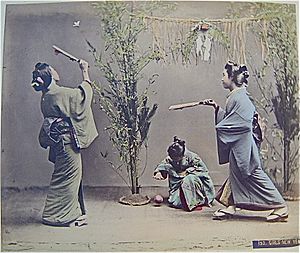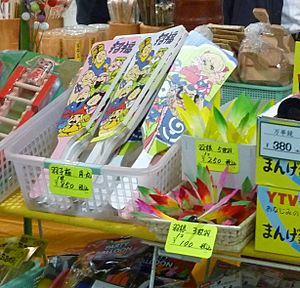Hanetsuki facts for kids
Hanetsuki (Japanese: 羽根突き or 羽子突き) is a fun, traditional Japanese game. It's a bit like badminton, but you don't use a net! Players use a special wooden paddle called a hagoita. They hit a colorful shuttlecock, known as a hane. This game is often played by girls during the Japanese New Year. However, anyone can play it!
Contents
What is Hanetsuki?
Hanetsuki is a classic Japanese game that has been enjoyed for many years. It is similar to other racket games played around the world, like Battledore and shuttlecock. The main goal is to keep the shuttlecock in the air using your paddle.
The Equipment You Need
To play Hanetsuki, you need two main things:
- A hagoita: This is a rectangular wooden paddle. Some hagoita are plain, but many are beautifully decorated. They often feature pictures of famous kabuki theatre performers or popular celebrities.
- A hane: This is the shuttlecock. It's usually brightly colored and designed to fly well when hit. Long ago, people sometimes used soapberry nuts as shuttlecocks!
How to Play Hanetsuki
There are two main ways to play this exciting game:
- Solo Play: One person tries to hit the hane and keep it in the air for as long as possible. It's a great way to practice your skills!
- Two-Player Game: Two people hit the hane back and forth, trying not to let it touch the ground. It's a bit like a friendly rally.
The Fun Tradition of Hanetsuki
If a player misses the hane and it falls, there's a playful tradition! They might get a mark on their face with India Ink. Don't worry, it's all in good fun!
Traditionally, people believed that the longer the hane stayed in the air, the more protection players would get from mosquitoes in the coming year. So, keeping the shuttlecock up was not just about winning, but also about good luck!
Hanetsuki Today
While Hanetsuki might not be as popular as it once was, it's still a cherished part of Japanese culture. You can often find decorative hagoita paddles being sold all over Japan, especially around New Year's. These beautiful paddles are often bought as gifts or for display.
The game is also sometimes known by other names, like Oibane (追い羽根, 追羽根, or 追羽子).
See also
 | Isaac Myers |
 | D. Hamilton Jackson |
 | A. Philip Randolph |



